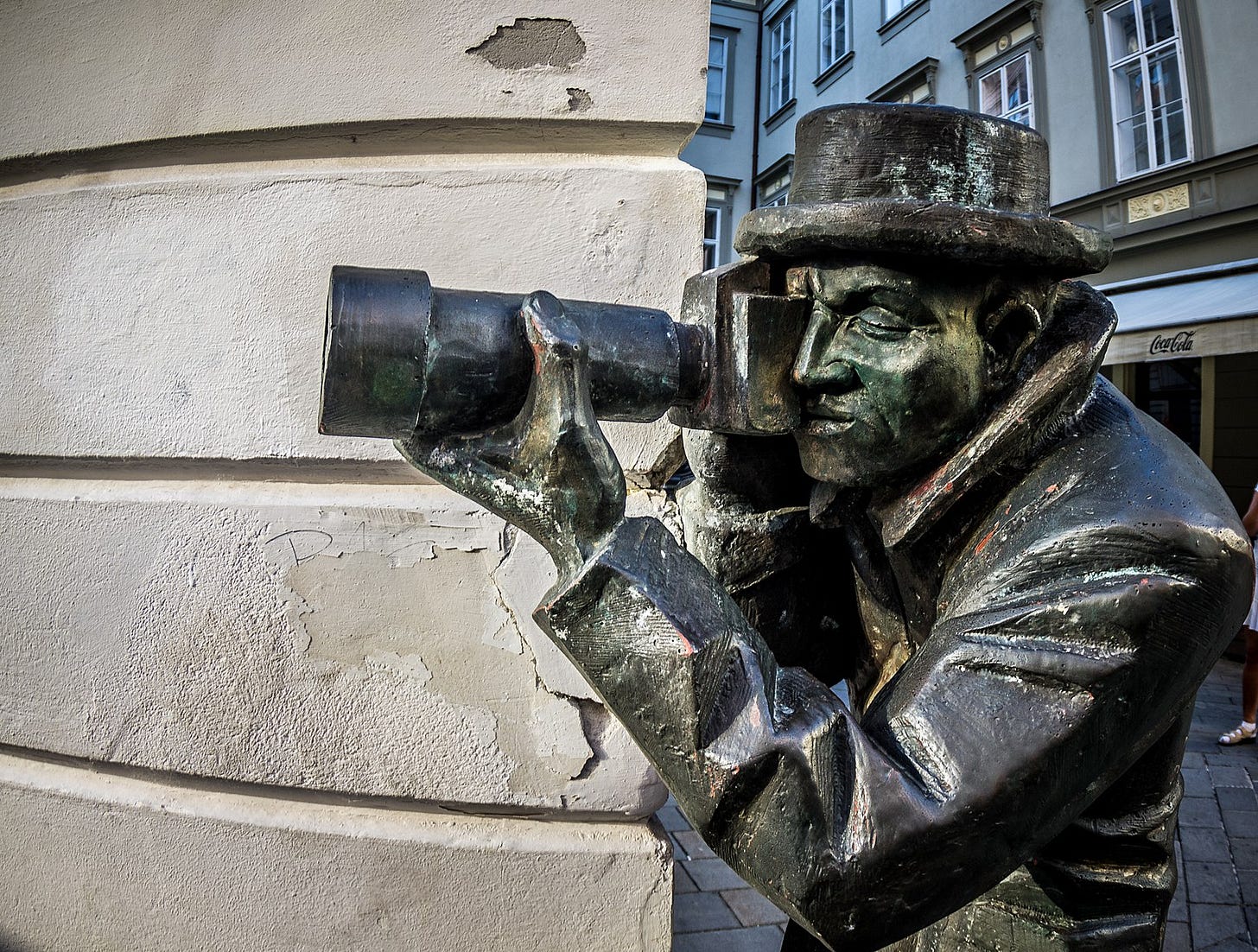
Everything seems to be of a piece at the moment. News stories that, on the face, have no connection, somehow seem to make sense, to rhyme. Clicking between a few news articles in my browser, I closed one lamenting Meghan Markle’s influence on Harry Windsor and another popped up with the headline 'Bung a bob for a Big Ben bong'. I pinched the top of my nose and closed my eyes. What the fuck is happening to me? I thought. I opened them again: a former TV show host and journalist who made a career with outrageous polemics against the European Union stared back out at me. Something about a lie about bendy bananas, my brain told me, something about Italians demanding smaller condoms, because they’ve only got little cocks. Oh yeah. That’s it. The Prime Minister.
He was issuing a call to arms from the British public. We need to donate £500,000 within the next two weeks, he said. On 31st January, Britain will formally leave the European Union, although, in reality, the country will begin an eleven month ‘transition period’ during which the actual logistical difficulties — the border arrangements that risk rekindling almost a century of paramilitary violence, the legal status of millions of workers both in the UK and in Europe, the management of stable food and pharmaceutical supplies to an entire country — you know, the little details — will be ironed out. But back to the big issue — the bongs. Big Ben, the thirteen ton bell that hangs in the Palace of Westminster, is currently out of service as renovations on the Elizabeth Tower take place. Some people think that, to celebrate an occasion as momentous as leaving the EU, Big Ben should ring, but to enable that, given the pause in work needed, it’ll cost half a million quid. Mark Francois, a ludicrous scotch egg of a man, is pushing the campaign.
There’s a reason the two stories seem so similar. Both the Big Ben Bong and Harry and Meghan’s decision to throw in the monogrammed towel and become private citizens are examples of what happens when, having built up an issue as a key culture war battleground, right-wing culture warriors finally, even unexpectedly, get their way. Using the same bellicose rhetoric, the same talk of wokeness and invocation of English exceptionalism, both Mark Francois and the Meghanomaniacs have built campaigns and careers on the back of these symbolic obsessions. This, I thought, is what it looks like when the culture warriors win?
There’s a hole in English culture, a fundamental lack of substance. In his recent book New Model Island author Alex Niven suggests that England as a nation, having donated its identity to an empire that has now fallen, doesn’t really exist. England’s regions, once powerful economic and cultural entities that provided alternative modernist identities, have been stripped bare by deindustrialisation and disinvestment over the past 40 years, leaving a South-East/London-focused centre of gravity to the country’s life that holds on an imperial malaise in stead of a national identity. On his podcast 301: Permanently Moved last week, Jay Springett said:
Unlike other cities, London is a total city. It is not only the capital, it is also the financial centre, and the creative centre, and the political centre, and the seat of the sovereign. Other countries have these sources of power and influence distributed… London is a gravity hole, one that swallows investment, money, infrastructure, and even souls.
The newspaper industry and England’s print media is at the cultural centre of that gravity hole. The strength of the newspapers is a unique aspect of English culture, compared to the US or other European nations. The print media draws its ideas from a staggeringly narrow sector of English society — a study in 2014 showed that almost half of England’s newspaper columnists went to Oxbridge, a higher percentage than even the House of Lords — with a unique dynastic element: Toby Young’s father was a baron, Polly Toynbee writes for the same paper as her father, Jacob Rees Mogg’s father was also a baron who edited the Times, Giles Coren and Victoria Coren Mitchell’s father was also a columnist, Marina Hyde and Camilla Long are both the daughters of barons. The executive editor of the Sunday Times is the son of the former editor of the Guardian. Patrick Wintour is the son of an editor of the Evening Standard; his sister is the editor of Vogue. All of these people, it goes without saying, are white. All but two went to Oxbridge, and one of those is Anna Wintour. You get the point. Perhaps getting paid to have opinions is genetic.
The pool is small, the voices loud, and the opinions repetitive. The English media is in the middle of a full-throated culture war, from bendy bananas to woke snowflakes, Stormzy to burqas, trans rights to free speech on campus. It seems like over the past decade the intensification of that journalism, combined with the exaggerating effect of social media on editorial choice, has created a print and TV comment culture dedicated to creating a popular spook or ogre, then to ripping it apart. The English press has developed into a unique combination of bullying and blackmail, where a relentlessly vicious tone of mockery and enforced conformity is policed with the justification that either the enemy is at the school gates, or that their furious mockery is “only banter”. In the process, from sheer incuriosity, a whole generation of journalists have confused disagreement with taking offence, criticism with trolling.
In the BBC television comedy The Office the tragic figure of David Brent, a relentlessly unfunny and unlovable boss who has “confused respect with popularity” is given a moment of bathos through comparison with his friend Chris Finch, an ignorant bully and practical joker, who, unlike Brent, doesn’t even mean well. The English press operates with the same logic; the people it mercilessly hounds are expected to suck it up and laugh along, or take it for granted. If they reject the culture as cruel or an infringement of their privacy, they’re subjected not only to the original abuse, but to an even worse charge — of not being able to take it. From Piers Morgan to Rod Liddle, Camilla Long to Jan Moir, the tone is exactly the same — you only exist as a cultural figure because we focus on you, and we can do and say whatever we want about you, and if you object you’re a spoilsport, a sourpuss, a snowflake. An aggressive and machismo culture that was, in the 90s, projected onto northern, working-class ‘lads and ladettes’ is now fully owned by a print media largely drawn from elite public schools and literary dynasties. They’re the Establishment, they’re in charge, and do not, under any circumstances, get too big for your boots.
The result is a one-tone, one-and-a-half-joke atmosphere. One of the many crimes of Meghan Markle is that she is “woke”, although, Lord knows, I can’t figure out what it is that she’s done that’s “woke”, besides existing as a woman of colour and holding her own opinions. But if you want to know what “woke” means, and why a “woke elite” are trying to shut down all criticism, why not read Andrew Doyle’s new book, ‘Woke’, in character as Titania McGrath, with glowing reviews from Rod Liddle, Sarah Vine and Ricky Gervais? Why not read Brendan O’Neill’s spiked editorial on Markle, “A woke Wallis Simpson”? Why not read Rod Liddle’s latest on the “wokeplace romance”? Why not check out Toby Young on how the Labour Party got woke and broke? Why not see what Sarah Vine likes so much about Ricky Gervais, “the Wokefinder General”? Why not read Helen Lewis on the superwoke elite, or listen to Helen Lewis on the News Quiz, supposedly the country’s leading news satire radio programme, where the assassination of Soleimani revolved around a joke that the Left wouldn’t have criticised the attack if the Iranian general had misgendered someone. All this in the last month alone. I’m done. The satire is about as biting as I am now I have caved my own teeth in from sheer frustration and boredom. Last week Rod Liddle and Giles Coren wrote almost exactly the same article on the ungrateful Duchess, and the worst thing about it is, it probably wasn’t even plagiarism — the whole culture war is so predictable, the same turgid, shitty jokes pumped out by the same talentless, hateful old hacks, that, like monkeys on typewriters, it inevitably happened by chance.
Yes, these jokes are not funny because they are by privileged people at the expense of vulnerable people, pretending that the vulnerable people are powerful people. But, importantly, these jokes are also not funny because they’re just not funny. The humour is, like England, hollow, substanceless, without a punchline. It’s the hollow laughter of recognition and repetition, Chris Finch’s injoke told again and again, dishing out humiliation to others yet so sensitive to criticism themselves that they’re only ever one critical tweet from throwing your shoes over a pub to prove they won.
We are reaching the culture war singularity. To all intents and purposes, in terms of England, the right have won the culture war on most fronts. But now they’re left with a problem — they need an enemy. After we leave, and Francois has had his bongs, what replaces the narrative of EU tyranny that has driven English Euroscepticism? Of course, there’s no point waiting for anyone to take the blame for the inevitable problems, much less for any mechanism to hold culture warriors accountable for the consequences of their actions, but it is worth the rest of us being aware that new spectres and enemies will have to be fabricated. It seems inevitable that immigrants and people of colour more generally will face a new wave of demonisation in the press. I also suspect we can see a wider rebirth of a moral majority-style cultural conservatism, with Britain’s home-grown press transphobia being stoked alongside imported “problems” such as drag queens reading to kids, or a moral panic around gay sex perhaps.
I think Meghan and Harry’s response is informative here. It may not surprise you to discover I am not a monarchist, but the petty viciousness that Meghan has endured from day one of being a Windsor has been astonishing. The role of the “Royal Correspondent” or “Royal Expert” is also a unique part of the British press: the job is a form of fiction writing, producing and projecting believable and compelling narratives onto the essentially unknowable and meaningless inner lives of people whose constitutional role is precisely not to have inner lives. These people are dessicating human ghouls, parasites on the back of parasites, maliciously projecting and meddling in the lives of people who they claim to venerate and adore, but the stories they tell reveal the ideologies they subscribe to. It is telling that, when Meghan and Harry react to the self-evidently racist obsessions of the press, the columnists swing into action to mock them for not being able to take it. These obsessions have deep roots in English culture, and the culture war finds fertile ground in parts of England, where racism is still rife and unacknowledged, and where suggesting someone might be racist is worse that actually being racist. Stormzy, another hate figure of both the columnists and Little England, laid it out in a recent interview on US radio: “Brits are super in denial [about racism]...someone on talk radio the other day said ‘I just look at her and I think…she’s just got that arrogance’. Nah, she’s just black, bro… if you told someone ‘write a list as to why you hate Meghan Markle’ the list is rubbish. There’s nothing, there’s nothing credible to it.”
I find it hard to imagine that Harry can regard the press with anything less than disgust. Before Princess Diana’s death, which, at the time, both media and public agreed was partly down to obsessive press coverage, she was little more than reckless and indecent. After, she was a saint, and everyone agreed this must never happen again, and the Daily Mail promised not to publish paparazzi photos again. Of course, they didn’t, and within years photos of his mother’s corpse were on TV and in magazines, and the Daily Express was weekly running headlines such as “Perhaps Diana should have worn seatbelt”. They did that to his mother, and they would do it to his wife given half a chance, before branding her a misunderstood martyr too. They are lying, venal scum without an ounce of moral fibre, with no understanding of the meaning of self-reflection. In their own eyes they are the backbone of contemporary English culture. To an extent they are right, and that should weigh on their shoulders as a heavy shame.
Meghan and Harry Windsor haven’t left the Royal Family, they’ve left the British media. And, honestly, who can blame them? Instead, we can learn from them. Faced with a loaded dice, bound never to be anything more than a sounding board for the racism and misanthropy of English culture warriors, Meghan simply chose not to meet the enemy on the field of battle. If you don’t have to, why would you? She is the first major deserter of the culture war.
British author Reni Eddo-Lodge has been consistent in her calls for anyone seeking a meaningful discussion on race to step out of the media landscape, of putting yourself up for a culture war debate in order to be punched down for ratings. This week on Twitter she made her reasons clear, stating:
“The whole point of them seems to be Punch & Judy style entertainment to drive ratings. TV producers call the process of finding guests 'casting' for a reason...The question of how to discuss anti-racism with the widest possible audience is never going to answered by a television producer named Poppy working at ITV studios 🤦🏿♀️ For me, it takes place on the right terms or it doesn't take place at all...I just don't understand how anyone's been convinced that participating in a reductive TV debate is the only way to get a point across? I wrote my book because I wanted people to spend more than five minutes on the arguments. We have to move beyond soundbites.”
As the right begins its hunt for new targets, new obsessions, such an approach is the only way to develop a culture that moves beyond the ‘gravity hole’ of both London and its culture warriors. Jay Springett ends his podcast by encouraging listeners to reconnect with local news and politics, and to follow blogs and RSS feeds, as a remedy to the gravity hole. And I was struck by the tone of hope in New Model Island, focusing on new models of regionalism and their political and cultural possibilities to counter the uneven weighting of London and the South-East.
One by one, the subjects of the culture war are backing away. Nobody wants to be friends with English culture any more, the toxic “character” in your group of friends who has developed “banter” as a personality, who calls you a gay cunt then says calm down mate, it’s just a joke, who holds his finger to his nose and does a goose-step whenever there’s a German in the room. Mark Francois’ Top Gear-style antagonism works in gaining airtime and column inches, but produces nothing of value. Coverage of Meghan Markle has, likewise, produced nothing of value — nobody has gained a moment of insight, a shred of understanding of themselves or the world, nobody has been enriched or moved. There is nothing here for us.
Of course, opting out totally is neither possible nor desirable; yes, the culture warriors thrive on having something to push up against, but sometimes things need to be resisted, loudly and clearly. But if we must fight the culture war, we should do it as guerrillas, striking on our own terms before retreating to our communities, where we can continue to build our lives, our systems of support, our music, writing, politics, sport, gaming and blogging scenes, rather than pouring endless energy into an outrage machine whose only product is our own exhaustion and defeat. Jay reiterates to me the same maxim, all the time: “Your attention is sovereign. The media thinks it owns it.” I believe, more strongly than ever, in the personal and political implications of that. We are personally responsible for where we put our energy, our attention, and we can change our habits of engagement with a media culture that is currently, quite clearly, our enemy.
Thanks for reading my weekly newsletter, utopian drivel. If you’d like to get an essay or story every week, please subscribe. I’ve written more on the culture war here.
In line with what I was saying above, my aim this year is to read more newsletters and blogs, and fewer mainstream newspapers or twitter. Here’s some newsletters I’ve been enjoying this week:
awful mass: If you like architecture review blogs, you’ll hate this architecture review blog. If you hate architecture review blogs, you’ll like this architecture review blog.
Age of Invention by Anton Howes: A ‘historian of innovation’ doing regular, focused accounts of technological and economic innovations during the Industrial Revolution in Britain.
time for some mage theory, an occasional newsletter by Sz Marsupial, is very good. The most recent is on a love affair with mulch, and ‘the snails and slimes’ within.
ways of eating food writing by Rebecca May Johnson, whom I’ve never met but feel friends with through the internet, and hope to eat with someday, which somehow feels like the spirit of 2010 is still possible. Somehow both critical and romantic, Nigella shared her last piece which says all you need to know.
Visit them and subscribe to them!













Share this post